Chilean Pastel de Choclo is an iconic dish—a summer classic. Traditional Pastel de Choclo is usually cooked in a clay dish inside a wood-burning oven if you live in the countryside. A standard oven and a baking pan are enough if you live in the city. The flavors of the meat and corn mingle delightfully in this casserole.
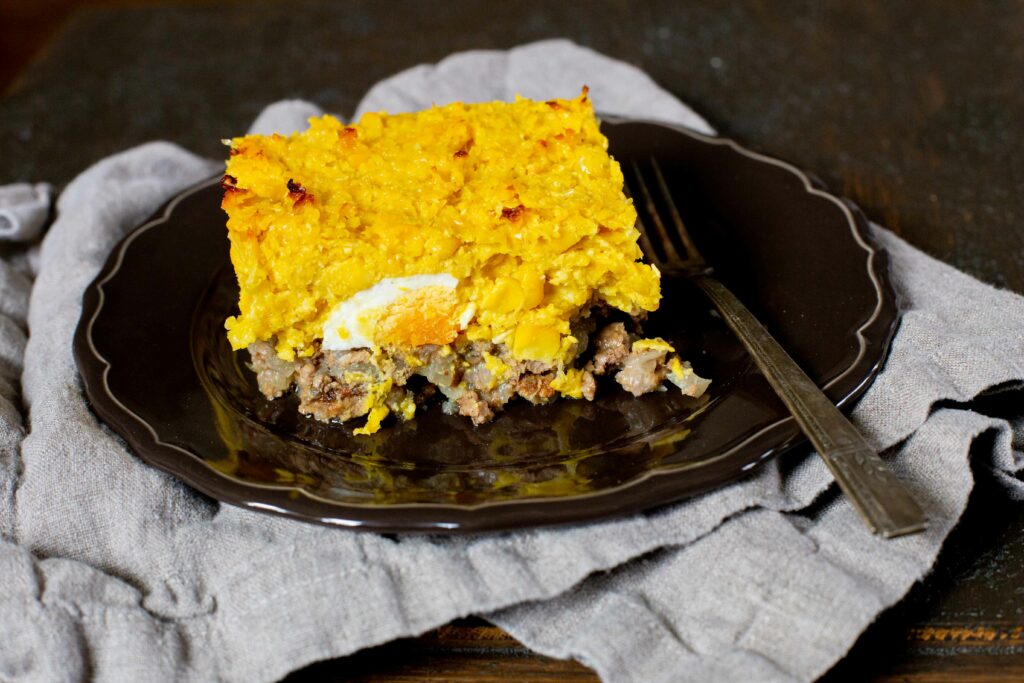
Chilean corn is different from the varieties available in the USA. Read ahead for tips on how to get the best result with US ingredients.
What is Pastel de Choclo?
Pastel de choclo is a traditional dish from Chile, typically made with a filling of Pino (ground beef mixed with onions)—a piece of chicken (a leg or ¼ breast), raisins, and olives are also commonly added and topped with a layer of sweet corn purée. The sweet corn topping is usually mixed with basil or other herbs to add flavor.
The dish is typically baked in an oven and served hot. Ensalada chilena, a simple salad made with tomatoes, onions, and cilantro, is usually eaten as a side. Pastel de choclo is a popular comfort food in Chile, enjoyed at family gatherings and special occasions.
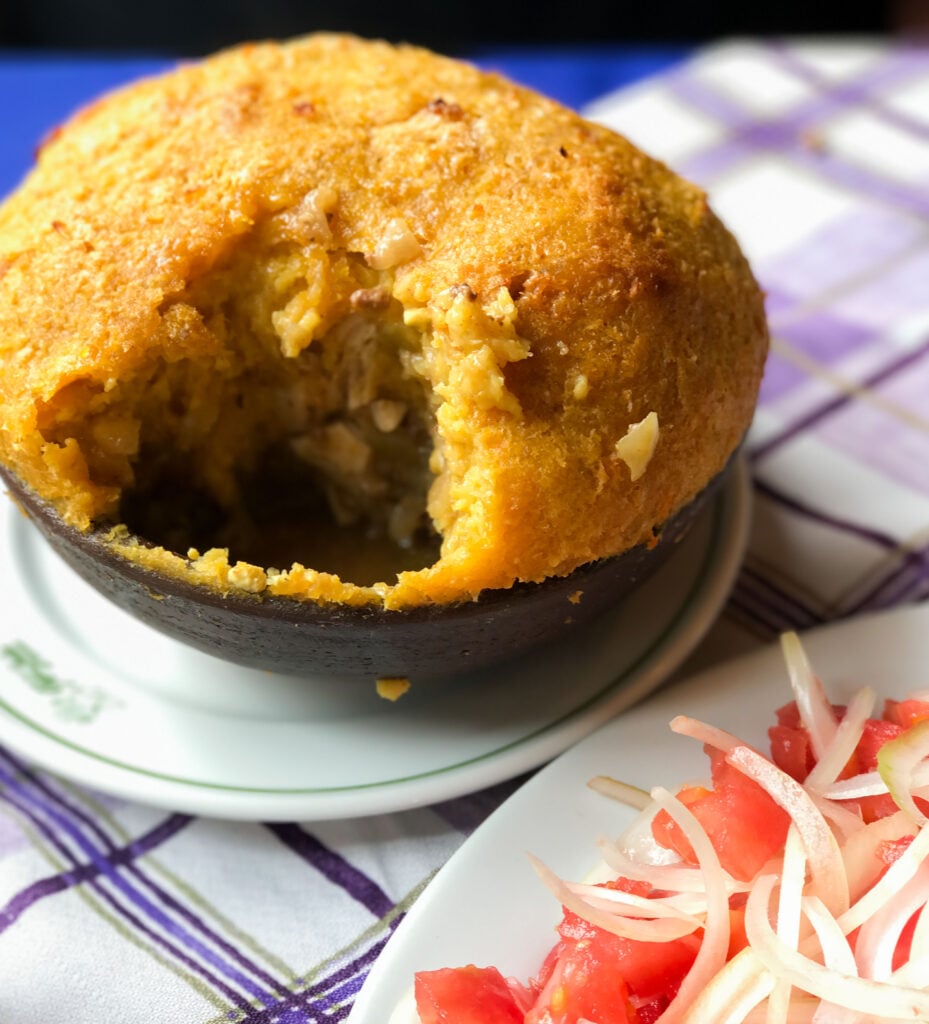
Pastel de Choclo is one of the most classic examples of Chilean Criolla cuisine. It combines a native product like corn with European meat (beef). The word "Choclo" comes from the Quechua name for corn.
The corn used for this recipe is not the long, narrow, corn-on-the-cob type but a short, wide, yellow corn called Choclero, Humero, or Cristalino. When grated, this corn yields a creamier paste.
Print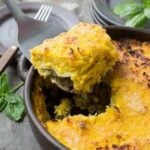
Pastel de Choclo Corn and Beef Casserole
- Prep Time: 1 hour
- Cook Time: 30 minutes
- Total Time: 1 hour, 30 minutes
- Yield: 6
- Category: Savory
- Method: Baked
- Cuisine: Chilean
Description
The Chilean version of Sheperd's pie with a twist: corn pudding on top.
Ingredients
For the corn mixture,
- 2 tablespoons butter
- 4 bags of frozen corn (454 grams each) or 10 cups
- ½ cup whole milk
- 3 tablespoons cornmeal
- 1 bunch basil, about 10 leaves, Sweet basil, preferably
- salt, pepper and Merkén or paprika
For the meat,
- 2 tablespoons of vegetable oil
- 2 pounds ground beef
- 1 cup water or beef broth
- 3 onions, diced small
- Merkén or 1 tablespoon sweet paprika
- ½ teaspoon ground cumin
- salt, pepper
- 2 tablespoons flour
Optional: cooked chicken, hard-boiled eggs, olives, and raisins
Instructions
For the meat, it can be done the day before,
- Heat the oil in a large pot. Sauté the beef until lightly browned, about 8 minutes, stirring occasionally. Add the paprika, salt, pepper, cumin, and sauté for 2 minutes more.
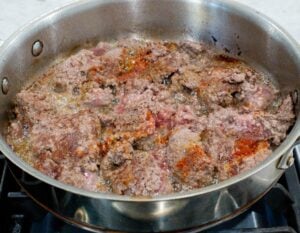
- Add the broth and simmer for 30 minutes over low heat.
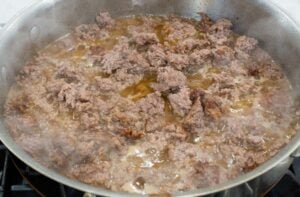
- Add the onion, mix well, and cook over medium heat until tender, about 30 minutes, stirring occasionally.
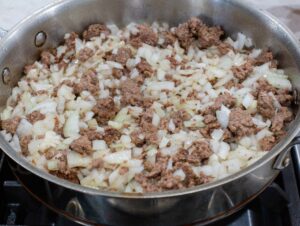
- Turn off the heat, add the flour, and stir well. Adjust the seasoning if necessary. Cool and refrigerate, or use immediately.
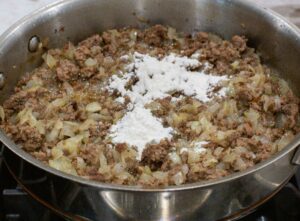
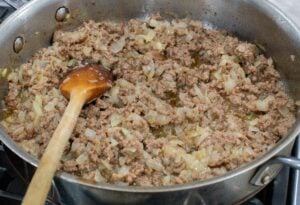
For the corn mixture,
- Melt the butter in a cast iron or large pot with a thick bottom over medium-high heat. Add the frozen corn and stir occasionally for about 8 minutes.
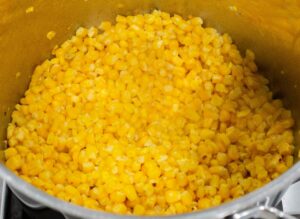
- Add milk, basil, salt, pepper, and Merquén or paprika and continue to cook, occasionally stirring for about 10 minutes longer.
- With a hand blender, blend the corn, trying not to go uniform, leaving some chunky parts. Add the cornmeal and continue cooking over medium heat for 5 minutes. The consistency should be firm. Taste and adjust seasoning. It will thicken slightly when cool.
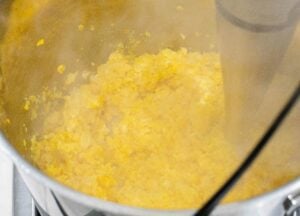
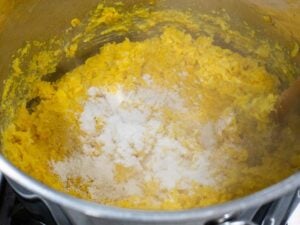
To assemble the pie,
- Put one layer of the prepared meat filling on a clay or baking dish. Add cooked or rotisserie chicken parts, quartered hard-boiled eggs, olives, and raisins on top of the meat.
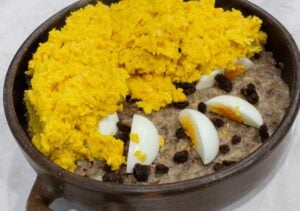
- Cover with the corn mixture. Sprinkle with granulated sugar for a nice browning in the oven.
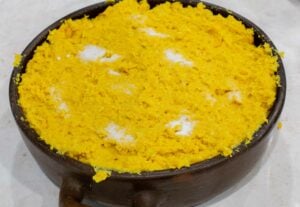
- Bake at 400F or 200C in a preheated oven for 45-60 minutes until bubbling and golden on top. Let stand 10 minutes before serving.
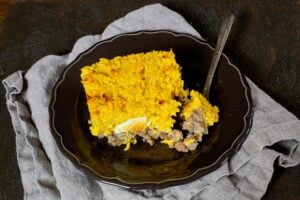
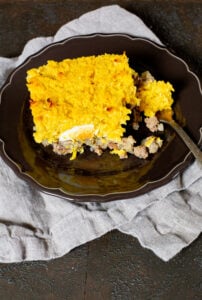
Nutrition
- Serving Size:
- Calories: 621
- Sugar: 19.6 g
- Sodium: 230.6 mg
- Fat: 27.5 g
- Saturated Fat: 13.2 g
- Carbohydrates: 59.8 g
- Fiber: 6.4 g
- Protein: 40.6 g
Tips for a delicious Chilean Pastel de Choclo:
What variety of corn is traditionally used?
The Pastel de Choclo is made with Humeros corn. This variety of corn is widespread in Chile but very difficult to find in other countries. Humero corn has irregular kernels. If the rows of the grain are neat, they are not the correct ones.
The husk is hard. When you prick the corn, whitish milk comes out. Use fresh; don't store it for more than ten days. The corn dries out and loses its consistency.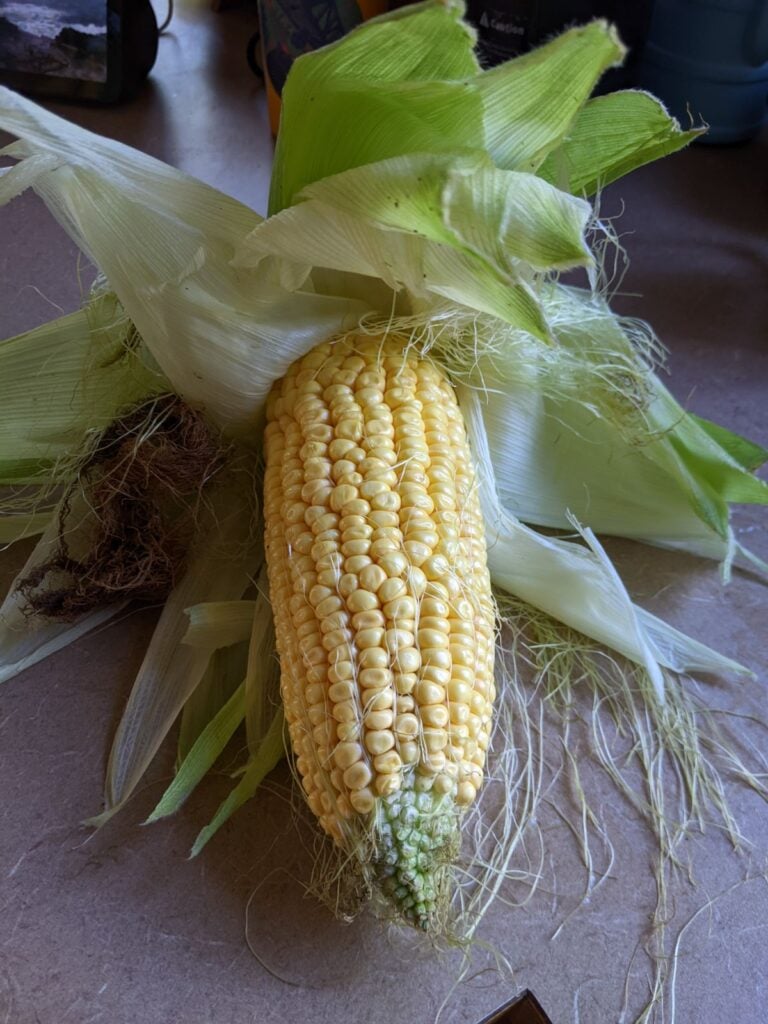
How do I replace Chilean corn in the US?
I recommend using frozen corn (yellow whole kernel) and adding cornmeal to thicken and improve the flavor while cooking the corn paste. The corn in the US is sweeter because it is a different variety.
Cornmeal works better than cornstarch and polenta. Never add sugar to the mix.
Do not use the Peruvian giant frozen corn available at Latin supermarkets. It will not work here.
Can I plant Chilean corn in the US?
Yes, you can follow the same calendar as the US corn varieties. Here, you can buy seeds.
Can I use canned corn, and what basil should I buy in the US?
I do not recommend using canned corn. It has more water than frozen corn. If you do not have an option, calibrate it with cornmeal to achieve the correct texture.
You have to be careful with basil. Thai basils have a lot of anise flavors. I recommend using sweet basil or Genovese (in moderation). Taste the basil before adding it to the corn paste.
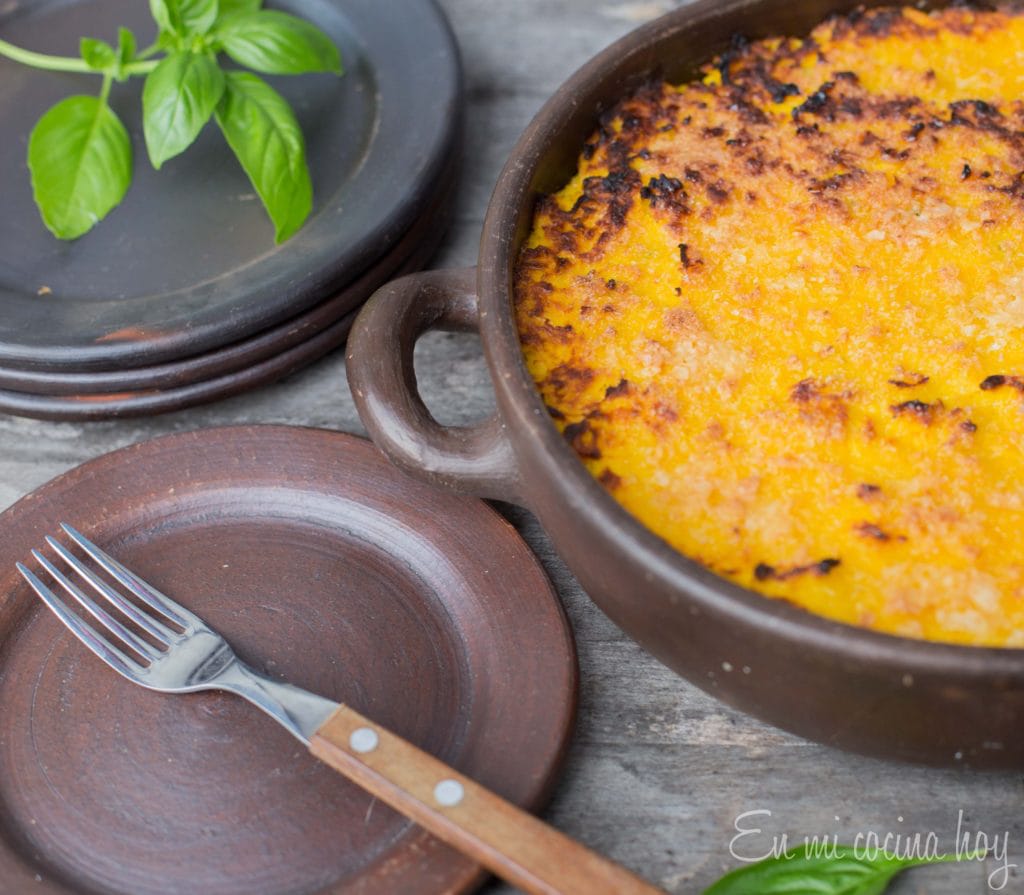
Proper sides for Chilean Pastel de Choclo are:
- Pebre sauce
- Salsa verde sauce
- Ensalada chilena
Is the Humero corn native or introduced to Chile?
Humero corn is a cross between native Chilean corn and a commercial variety introduced in the early 1900s. Corn was grown in Chile before the arrival of the Spaniards; it was an abundant crop from Copiapó to Chiloé.
They were the most popular crops, along with potatoes. The Spaniards introduced wheat, which partially displaced corn.
When does the Humero corn season start in Chile?
It starts showing up at markets in mid-December and is easy to find until early March.
How do I cut the corn?
Break the base of the corn or shank, peel the husk, and remove all the silk. Cut from top to bottom with a large knife, and the corn stands firm.
You can do it in one pass, almost touching the cob, or several passes (2-3) so the grain is finely chopped. Do it as seen in the photo so that they keep all the juices or milk from the corn.
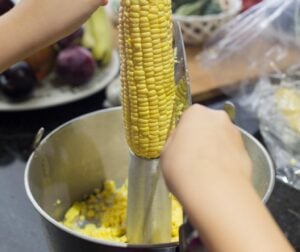
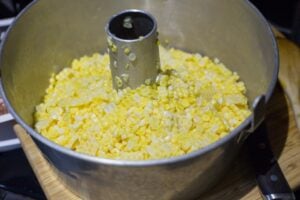
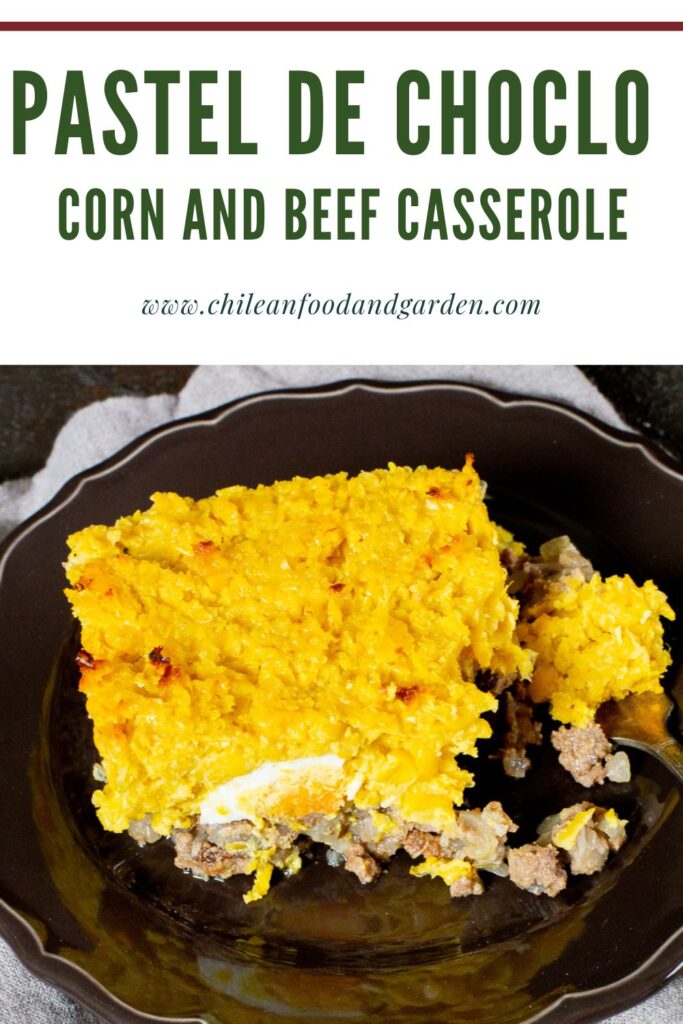

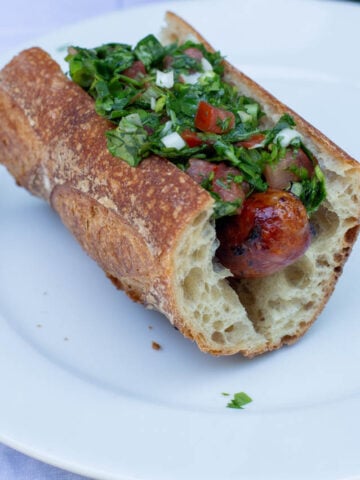
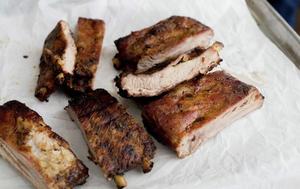
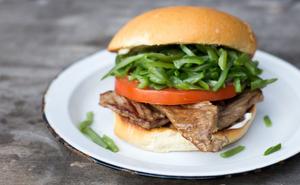
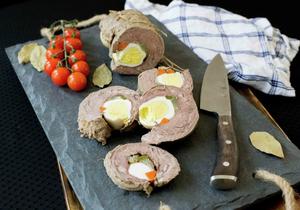
findtubes says
Add the ground beef, cumin, 1 teaspoon salt, and pepper. Cook, stirring, until the beef is crumbled and browned. Remove from heat and set aside.
Pilar Hernandez says
Do you have a question?
Fabienne Pizarro says
Can it be frozen in the clay dishwasher
Pilar Hernandez says
What do you mean with the "clay dishwasher"? In general, Chilean clay dishes can be frozen. But can NOT go on the dishwasher.
Liz says
Thank you for this wonderful recipe! My husband is Chilean and I just made it for his birthday dinner -- it was a success! I look forward to trying out more recipes from your site. Abrazos desde Seattle.
Pilar Hernandez says
Wonderful. Welcome, and please let me know if you have any questions.
Maria Gonzalez says
Hi, curious what HEB corn is listed on the ingredients list?
Pilar Hernandez says
The sweet yellow one, some times I mix half and half with the whole kernel one.
Cookie Man says
Hola! I see hard boiled eggs in the photos, but they are not mentioned in the recipe. Can I simply add them? Michael
Cookie Man says
Also...would I be insulting tradition if I put some cheese on top? What type would you recommend?
Pilar Hernandez says
Is not traditional, but go for it, make it your dish.
Pilar Hernandez says
Yes, I will add them. They are traditional to the recipe. Thanks for commenting.